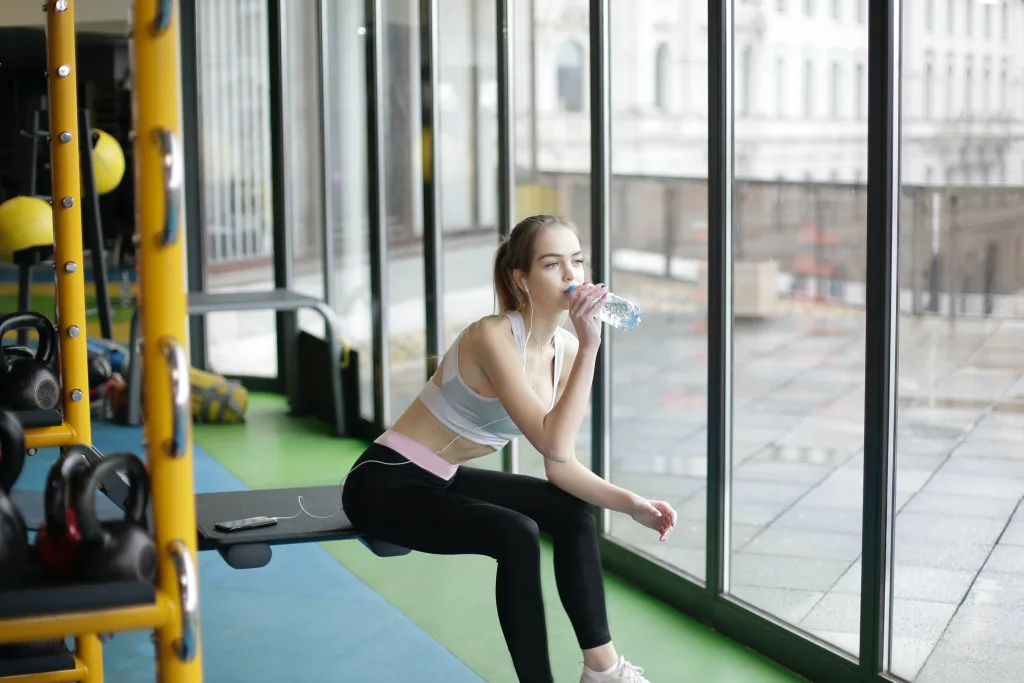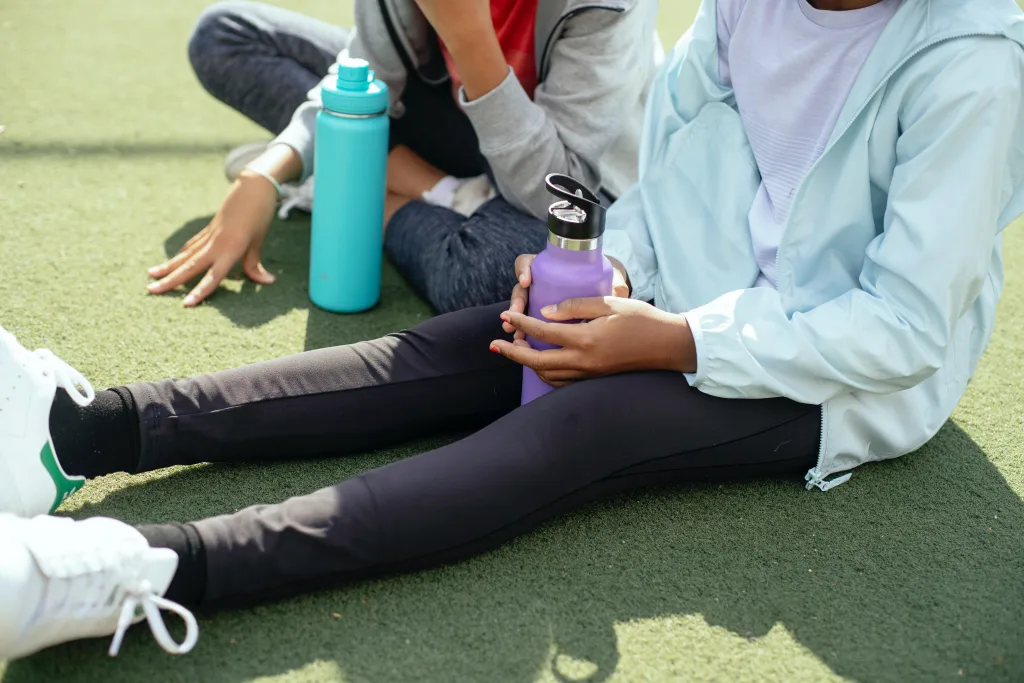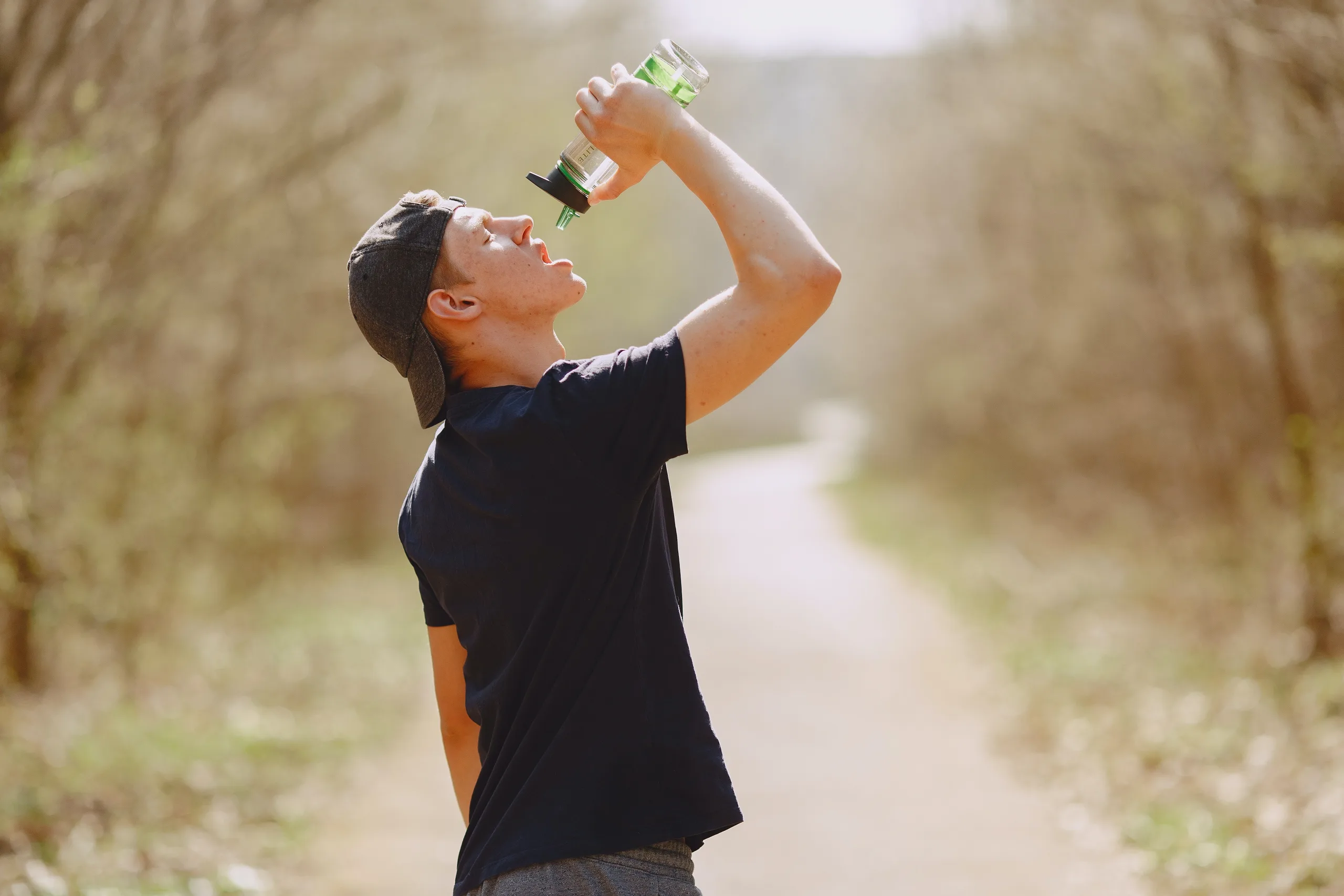Embrace the realm of ‘Water Wednesday’ anew! Each Wednesday, we plunge into the impactful link between hydration and weight loss. Today, we’re uncovering the scientific intricacies behind how drinking water can turbocharge your weight loss journey. Join us as we explore the science of hydration, quench your thirst for knowledge, and supercharge your path to weight loss success.
Are you on a weight loss journey and seeking a simple yet effective ally? You’ve got one right in your kitchen tap. Yes, it’s water. Many of us overlook the power of this essential element in the context of weight loss. However, science backs the claim that water can significantly aid your weight loss attempts. Let’s dive deeper into how this works.
One reason for this is that water acts as a natural appetite suppressant. When you consume enough water, your stomach sends signals to your brain that it’s full. This reduces your hunger pangs and curbs unnecessary snacking.
Moreover, water has been shown to increase calorie burning. Think about it, your body needs to heat up the water you drink to match your body temperature. This process burns calories, providing an unexpected but welcome boost to your weight loss efforts.
Water also plays a crucial role in removing waste from your body. When you’re dehydrated, your body can’t efficiently eliminate waste, leading to bloating and even weight gain. Staying properly hydrated helps your body efficiently process and remove waste.
Lastly, substituting high-calorie drinks with water reduces your overall calorie intake. Whether it’s soda, juice, or sweetened coffee, replacing these calorie-loaded drinks with water can contribute to significant weight loss over time.
So, next time you reach for a snack, consider having a glass of water first. It might be the game-changer in your weight loss journey.

The Importance of Hydration for Weight Loss
How Water Affects Metabolism
Water plays a crucial role in our body’s metabolism, which is the process by which our bodies convert food and drink into energy. When we are dehydrated, our metabolism slows down, making it more difficult for our bodies to burn calories efficiently. In fact, studies have shown that drinking water can temporarily increase the body’s resting energy expenditure, or the number of calories burned while at rest[^1^]. This means that by staying hydrated, we can boost our metabolism and potentially enhance our weight loss efforts.
The Role of Water in Digestion and Absorption
Water is essential for proper digestion and absorption of nutrients. It helps break down food in the stomach and aids in the absorption of nutrients in the small intestine. When we are dehydrated, our digestive system may not function optimally, leading to digestive issues such as constipation and bloating[^3^]. By staying hydrated, we can ensure that our digestive system works efficiently, allowing us to properly digest and absorb the nutrients from our food.
Water as a Natural Appetite Suppressant
Drinking water can also help with weight loss by acting as a natural appetite suppressant. Research has shown that drinking water before meals can help reduce calorie intake by creating a sense of fullness in the stomach[^1^]. This can help prevent overeating and unnecessary snacking throughout the day. In one study, overweight females who drank 500 milliliters of water before each main meal experienced a reduction in body weight, body fat, and reported appetite suppression[^2^]. By making it a habit to drink water before meals, we can help control our appetite and make healthier food choices.
Conclusion
Ensuring adequate hydration is an important aspect of any weight loss journey. By understanding the impact of water on our metabolism, digestion, and appetite, we can leverage its benefits to support our weight loss goals. Remember to drink water consistently throughout the day, especially before meals, to stay hydrated and maximize its effects on weight loss.
Click here to learn more about the importance of hydration for weight loss.
[^1^]: Healthline: Weight Loss and Drinking Water [^2^]: Healthline: Weight Loss and Drinking Water [^3^]: Healthline: How Water Affects Digestion

Water and Calorie Burning
The Thermogenic Effect of Water
Have you ever wondered if drinking water can actually help you burn calories? Well, the answer is yes! When you consume water, your body goes through a process called thermogenesis, which is the production of heat. This process requires energy, and therefore, calories are burned in the process.
A study conducted on adults showed that drinking water can increase resting energy expenditure by 24-30% within just 10 minutes of consumption. This increase in calorie burning lasts for at least an hour. So, by simply drinking water, you can boost your metabolism and burn more calories throughout the day[^1^].
Cold Water vs. Room Temperature Water
Now you might be wondering if the temperature of the water you drink makes any difference in terms of calorie burning. Well, interestingly, it does!
A study on overweight and obese children found that drinking cold water resulted in a 25% increase in resting energy expenditure compared to room temperature water[^7^]. This means that when you drink cold water, your body needs to work harder to warm it up to your body temperature, resulting in more calories being burned.
So, don’t hesitate to add some ice cubes to your water or enjoy a refreshing glass of cold water to give your metabolism a little boost.
Drinking Water Before Meals to Increase Calorie Burn
If you’re looking for a simple and effective way to increase the number of calories you burn, try drinking water before meals. Studies have shown that this simple habit can have a significant impact on weight loss.
In one study, middle-aged overweight and obese participants who drank water before each meal lost 44% more weight compared to a group that did not increase their water intake[^4^]. Another study found that drinking water before breakfast reduced the number of calories consumed during the meal by 13%[^12^].
While this effect seems to be more pronounced in middle-aged and older individuals, it’s still worth giving it a try regardless of your age. Drinking water before meals can help reduce your appetite and calorie intake, ultimately leading to weight loss.
So, next time you sit down for a meal, make it a habit to drink a glass of water before you start eating. It’s a simple and effective strategy to support your weight loss journey.
Conclusion
In conclusion, drinking water can have a positive impact on your weight loss journey. By increasing your resting energy expenditure and boosting your metabolism, water can help you burn more calories throughout the day. Additionally, drinking water before meals can help reduce your appetite, resulting in a lower calorie intake. So, make sure to stay hydrated and incorporate this simple habit into your daily routine for maximum weight loss benefits.
Water and Detoxification
Water plays a crucial role in detoxification, aiding in the removal of toxins from our bodies. It is essential for various bodily functions and helps maintain overall health and well-being. In this section, we will explore the role of water in flushing out toxins, its impact on kidney function, and its contribution to skin health and detoxification.
The Role of Water in Flushing Out Toxins
Water acts as a natural detoxifier by assisting in the elimination of waste products and toxins from our body. Our liver and kidneys rely on an adequate supply of water to carry out their detoxification functions effectively. When we consume water, it helps transport toxins to the kidneys, where they are filtered and excreted through urine.
Additionally, water supports the elimination of waste through sweat and bowel movements. It aids in the proper functioning of our digestive system, preventing constipation and promoting regularity. Staying hydrated ensures that our body can efficiently remove toxins, reducing the burden on our organs and promoting overall health.
Water and Kidney Function
Our kidneys play a vital role in filtering waste products and maintaining fluid balance in our body. Adequate water intake is essential for optimal kidney function. When we are dehydrated, our kidneys cannot efficiently remove waste, leading to a buildup of toxins in our body.
Drinking an adequate amount of water helps ensure that our kidneys can effectively filter waste and maintain the balance of electrolytes in our body. It also helps prevent the formation of kidney stones, as water dilutes the substances that can crystallize and form stones.
To support your kidney health and promote detoxification, aim to drink at least eight glasses (64 ounces) of water per day. Remember, other factors such as physical activity and climate may increase your water needs, so adjust accordingly.
Water for Skin Health and Detoxification
Proper hydration is essential for maintaining healthy skin and promoting its natural detoxification process. Our skin is the largest organ in our body and serves as a protective barrier against toxins and pollutants. Drinking enough water helps keep our skin hydrated, promoting its elasticity and suppleness.
When our body is dehydrated, our skin may become dry, dull, and prone to various skin problems. By staying well-hydrated, we support the elimination of toxins through sweat, reducing the likelihood of skin issues such as acne and breakouts.
In addition to drinking water, you can also boost your skin’s detoxification process by incorporating hydrating skincare products and consuming a diet rich in fruits and vegetables. These foods provide essential nutrients and antioxidants that support skin health and assist in the removal of toxins.
To conclude, water plays a crucial role in detoxification by aiding in the removal of toxins from our body. By ensuring proper hydration, we support the optimal functioning of our kidneys, promote healthy skin, and facilitate the elimination of waste products. Make it a habit to drink an adequate amount of water daily to support your weight loss journey and overall well-being.
Related Websites:

Hydration and Exercise
Proper hydration plays a crucial role in maximizing the benefits of exercise. When engaging in physical activity, it is essential to maintain adequate hydration levels to support optimal performance and overall health. In this section, we will explore the importance of proper hydration during exercise, the effects of dehydration on exercise performance, and how water enhances fat burning during workouts.
The Importance of Proper Hydration During Exercise
Ensuring proper hydration during exercise is vital for several reasons. When you exercise, your body loses water through sweat, which can lead to dehydration if not replenished. Adequate hydration helps regulate body temperature, lubricate joints, and deliver nutrients to muscles, allowing them to function optimally.
Drinking water before, during, and after exercise helps maintain the body’s fluid balance, ensuring adequate hydration levels. It is recommended to drink about 17 to 20 ounces of water two to three hours before exercising and another 8 ounces fifteen minutes before starting. During exercise, aim to drink 7 to 10 ounces every ten to twenty minutes, depending on the intensity and duration of your workout. After exercise, replenish your fluids by consuming 16 to 24 ounces of water for every pound lost during exercise.
The Effects of Dehydration on Exercise Performance
Dehydration can have a significant impact on exercise performance. Even mild dehydration, as little as 2% of body weight loss from fluid loss, can impair physical and cognitive function. When dehydrated, your body struggles to maintain its normal functions, leading to decreased endurance, strength, and coordination.
Lack of proper hydration during exercise can also lead to fatigue, muscle cramps, dizziness, and increased heart rate. These symptoms can hinder your ability to perform at your best and may even increase the risk of injuries. Additionally, dehydration negatively affects your body’s ability to cool down, increasing the risk of overheating and heat-related illnesses, such as heat exhaustion or heatstroke.
To prevent dehydration during exercise, it is essential to drink fluids regularly and monitor your hydration levels. Remember to listen to your body and drink when thirsty, as thirst is a signal that your body needs hydration.
How Water Enhances Fat Burning during Workouts
Drinking water can also play a role in enhancing fat burning during workouts. When you exercise, your body relies on stored fat as a fuel source. Staying properly hydrated helps facilitate this fat-burning process.
Water is essential for the body’s metabolic processes, including the breakdown and transportation of fat molecules. Proper hydration ensures efficient metabolism, allowing your body to convert stored fat into energy effectively. Additionally, drinking water before and during exercise can help suppress appetite, reducing unnecessary snacking and promoting weight loss.
Hydration and exercise go hand in hand. By maintaining proper hydration levels, you can optimize your performance, prevent dehydration-related issues, and enhance fat burning during workouts. Remember to drink water regularly before, during, and after exercise to support your body’s needs. Stay hydrated and maximize the benefits of your weight loss journey.

Tips for Incorporating More Water into Your Weight Loss Journey
Setting Hydration Goals
Drinking an adequate amount of water is crucial for your weight loss journey. Setting hydration goals can help you stay on track and ensure you’re getting enough water throughout the day. A good starting point is to aim for at least eight 8-ounce glasses of water per day. However, individual needs may vary based on factors such as activity level, climate, and overall health.
To make it easier to reach your hydration goals, consider the following tips:
- Carry a Water Bottle: Keep a reusable water bottle with you at all times. This will serve as a reminder to drink water regularly and make it convenient to stay hydrated.
- Set Reminders: Use phone alarms or apps to remind yourself to drink water at regular intervals. This can be particularly helpful if you tend to forget to drink during busy periods.
- Track Your Intake: Keep a journal or use a hydration tracking app to monitor your daily water intake. This will help you assess if you’re meeting your hydration goals and identify any patterns or areas for improvement.
Infused Water Ideas for Added Flavor
If you struggle with drinking plain water, infusing it with fruits, herbs, or vegetables can add a burst of flavor and make it more enjoyable. Here are some infused water ideas to try:
- Citrus Burst: Slice some lemons, limes, or oranges and add them to a pitcher of water. This will give your water a refreshing citrus flavor.
- Berry Blast: Add a handful of fresh or frozen berries, such as strawberries, blueberries, or raspberries, to your water. This will infuse it with a subtle sweetness and vibrant color.
- Herbal Delight: Experiment with herbs like mint, basil, or rosemary. Crush the leaves slightly before adding them to your water for a hint of herbal goodness.
Remember to let the infused water sit for a few hours or overnight to allow the flavors to infuse fully. You can also adjust the intensity of the flavors by adding more or less of the ingredients.
Using Water as a Meal Replacement Strategy
Incorporating water as a meal replacement strategy can be an effective way to reduce calorie intake and support your weight loss efforts. While it’s important to consult with a healthcare professional or registered dietitian before making any significant changes to your diet, replacing one or two meals with water can be a viable option for some individuals.
Here are a few ways to use water as a meal replacement:
- Intermittent Fasting: Intermittent fasting involves alternating periods of fasting and eating. During the fasting periods, you can consume water to stay hydrated and help manage hunger.
- Water-Filled Foods: Choose foods with high water content, such as fruits and vegetables, to help increase feelings of fullness and hydration.
- Meal Replacement Shakes: Consider replacing a meal with a nutritionally balanced meal replacement shake that can be mixed with water. These shakes can provide essential nutrients while keeping calorie intake in check.
Remember, using water as a meal replacement should be done mindfully and in consultation with a healthcare professional. It may not be suitable for everyone, especially those with specific dietary needs or medical conditions.
Incorporating these tips into your weight loss journey can help you increase your water intake and reap the benefits of hydration. Remember, staying hydrated is just one piece of the puzzle, and it should be combined with a balanced diet and regular physical activity for optimal results.
Conclusion
In conclusion, the science behind how drinking water can boost your weight loss journey is both fascinating and encouraging. Numerous studies have shown that increasing your water intake can have a positive impact on calorie burning and appetite control.
By drinking just one serving of water, you can increase your resting energy expenditure by 24-30% within 10 minutes, resulting in the burning of more calories. Over time, this can lead to modest weight loss. Additionally, drinking water before meals has been found to reduce appetite, especially in middle-aged and older adults, leading to a decrease in calorie intake and further weight loss.
It is important to note that while drinking water can be beneficial for weight loss, it is not a magic solution on its own. It should be coupled with a balanced diet and regular physical activity for optimal results.
Incorporating more water into your daily routine is a simple and cost-effective way to support your weight loss efforts. So, make sure to stay hydrated and consider swapping sugary beverages for water to lower your caloric and sugar intake. By harnessing the power of water, you can enhance your weight loss journey and achieve your goals more effectively.
Thank you for reading this post, don't forget to subscribe to our free newsletter
!
